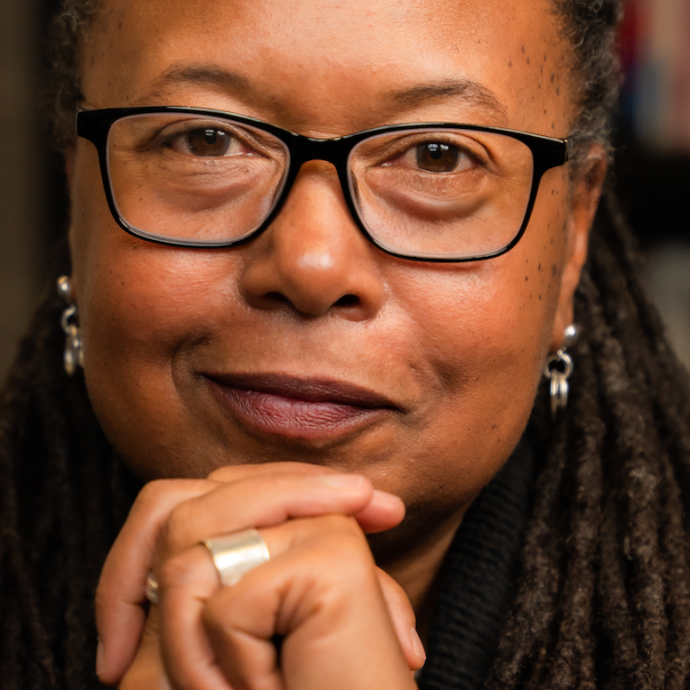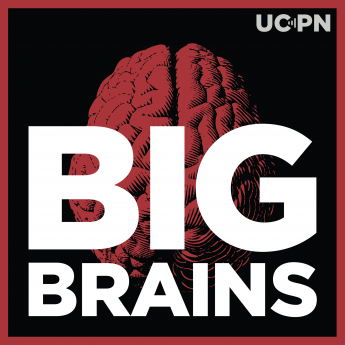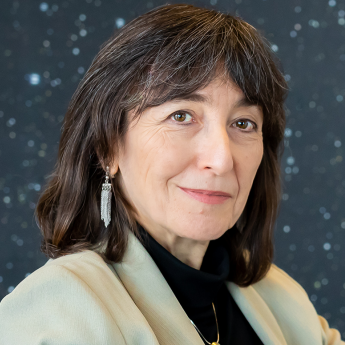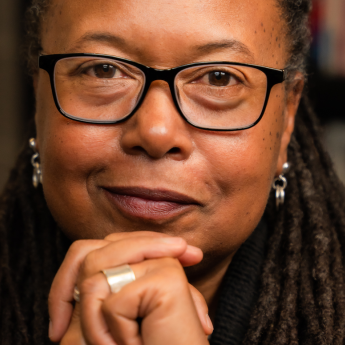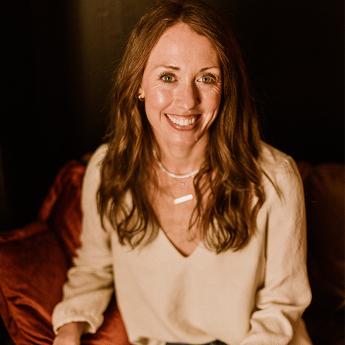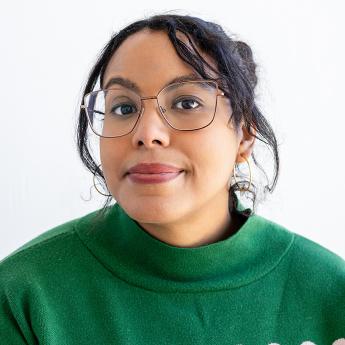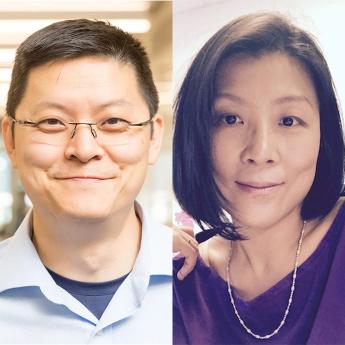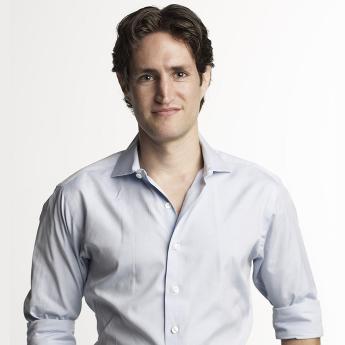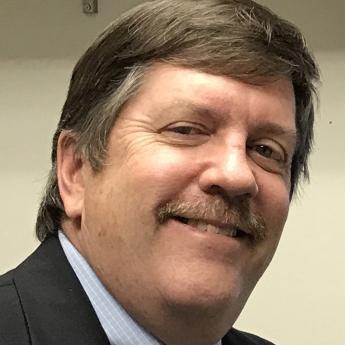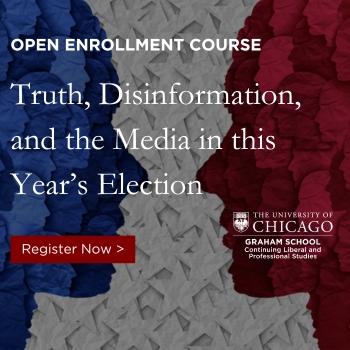Show Notes
One of the biggest questions of every election is: What’s going on with young voters? There is endless speculation on the news about what young people care about, but very little good research examining their views on the candidates and the issues that matter most to them. The first-of-its-kind GenForward Survey changed that when it was created in 2016 at the University of Chicago.
Led by renowned University of Chicago political scientist Cathy Cohen, the survey digs into what is animating young voters—especially young voters of color who are millennials and in Generation Z—and what they think of the candidates. With tight races in key swing states, young people might just hold the keys to the White House—and Cohen says that understanding what how they may vote in November is crucial to understanding the 2024 election
Subscribe to Big Brains on Apple Podcasts and Spotify.
(Episode published September 19, 2024)
Subscribe to the Big Brains newsletter.
Please rate and review the Big Brains podcast.
Related:
- Learn more about the GenForward survey
- The economy is the top issue for young voters—WBEZ
- UChicago political scientist Cathy Cohen named Carnegie Fellow: Prestigious fellowship will support GenForward Survey, new book project—UChicago News
- Big Brains podcast: What We’re Getting Wrong About Millennials with Cathy Cohen—UChicago News
Transcript:
Paul Rand: There’s one question on just about everyone’s mind this year. It’s all anyone can think about, all anyone can talk about. And that is, “What’s going to happen with the elections in November?”
Tape: This race for the White House certainly looked a lot different than it does now. But after a chaotic summer unfolded before our eyes, the race has changed and brought with it historic moments sure to be discussed for generations to come.
Tape: This race is close. Yes, historically close.
Tape: Historically close.
Paul Rand: There are many unique features of this race. But there is one aspect of every election season that is always the same, a question asked time and again, “How are young people going to vote?”
Tape: A new poll shows young voters could be the ones to ultimately decide this race.
Tape: The power of the Gen Z vote is making some presidential candidates shift their focus.
Paul Rand: And in this election, there is special attention being paid to how young people of color are going to vote.
Tape: Vice President Harris is leading the push to court voters of color.
Tape: Both the Trump and Harris campaigns are looking to court voters in the State’s so-called Latino Belt. Pennsylvania put President Joe Biden over the top in 2020 and is expected to play a big role in this year’s election.
Cathy Cohen: Well, I think there’s a real interest in young people and if they will turn out. My concern is it’s complicated.
Paul Rand: That’s Cathy Cohen, a distinguished professor of political science at the University of Chicago.
Cathy Cohen: The votes and the actions and the beliefs and agendas of young people matter. And they’re going to matter in this election possibly even more, because there are going to be razor-thin margins by which candidates win states and win the electoral college.
Paul Rand: When it comes to studying what young people care about politically, what their biggest concerns are, and how they feel about the candidates, there are surprisingly very little good research out there. Cohen changed all that with her one of a kind GenForward survey.
Cathy Cohen: So I started this project in 2016 with the changing demographics of the country on our way to becoming a majority people of color country. At the time in 2016, the movements that were being led by young people, for example, the Black Lives Matter Global Movement, it seemed to me that we should be hearing from centering the opinions, the politics, the preferences of young people. And in particular, young folks of color. And I just didn’t see that showing up in our discourse and our decision making.
And then, when you pair that with the growing evolution of the 24-hour news cycle where there was a need for content all the time. And increasingly, that content showed up as polls, right? “The American public thinks this,” and then there’d be a panel of people interpreting what the American public said in a survey. Those surveys underrepresented the number of young people and folks of color and young people of color to really dig deep and interrogate how they were thinking about the world. So really, GenForward is an attempt to intervene and to solve some of those problems.
Paul Rand: With turnout often lower amongst young people despite the size of their cohort, every political candidate is always trying to understand what animates them.
Cathy Cohen: If young people aren’t voting, it’s in part their fault. But we know that from lots of data that, in fact, the way people get to vote is one is habitual, so we start them early. Two, we provide an infrastructure, so we need to mobilize people. Three, we need to make sure, in fact, that there are politicians who speak to the needs and the issues and concerns of young people. So that’s what we’re trying to build, right? We’re trying to say, “If you build an agenda, they will come. It’s the field of dreams.”
Paul Rand: So what exactly is the agenda that young people are looking for this election year and are the current candidates building it?
Cathy Cohen: And so, I do think it matters. And I think it matters, in particular, in swing states where this is going to be a very close election and a higher turnout by young people can move those states.
Paul Rand: Welcome to Big Brains, where we translate the biggest ideas and complex discoveries into digestible brain food. Big brains, little bites from the University of Chicago Podcast Network. I’m your host, Paul Rand. On today’s episode, what the research says about reaching young voters.
The University of Chicago Leadership and Society Initiative guides accomplished executive leaders in transitioning from their long-standing careers, into purposeful encore chapters of leadership for society. The initiative is currently accepting candidates for its second cohort of fellows. Your next chapter matters for you and for society. Learn more about this unique fellowship experience at leadforsociety.uchicago.edu.
In a crowded landscape of political surveys and polls, the GenForward survey is truly one of a kind.
Cathy Cohen: So our survey is both complicated and pretty straightforward. Like most, when we decide, “We’re going to do a survey,” we figure out the outline and what are the subject areas that we want to cover. We then go out and I don’t do it, but there are often postdocs and research analysts who help with this process. They’ll go out and find, let’s say, 300 questions that cover the subjects that we’re investigating or we’re interrogating.
We then spend weeks narrowing that down to about 60 questions and we turn that over to NORC and they produce data for us. It usually takes about two weeks to be in the field. We get the data back. We investigate and interrogate and make sure the data is up to par. It always is. Then, we analyze it and disseminate it.
The idea is not just to collect data. But in fact, try to engage people in thinking with young people about the political world. So let me just say one other thing about our sample which is. Because we have this deep commitment to young people and folks of color and young people of color, we do this thing called oversampling. So we sample many more African-American, Latinx, Asian, and Pacific Islander respondents than traditional surveys do. In part because we want to feel comfortable and confident when we disaggregate that data and we want to be able to say something about Black men versus Black women.
Paul Rand: Okay. If I can just start digging into some of the survey results that come out, is that really many of the young people, really, are just unfavorable toward both parties at this stage.
Cathy Cohen: Yes.
Paul Rand: And is that different than what you’ve seen historically and why do we think we are where we are?
Cathy Cohen: Yeah. I think this is something we find over and over again. This is a pretty consistent finding. Young adults, generally, are not happy with either party. Or really, the two party system, they would say. Moreover, when we ask a question about, “Do you think democracy is working?” Majorities, maybe except for Democrats and, an interesting finding this time, young African-American adults, believe that our current democratic system, also, is not working. I think it makes sense. I always say that these young people are working with an expansive understanding of democracy. They’re not just talking about, “Am I able to vote?” They’re saying, “How do you handle criminal justice?” Young Black people are still being killed. They’re thinking about foreign policy and they may not like Biden’s policies around Gaza. They may not like how the Republicans think about and talk about immigration. I think for many young people, they believe the government is not functioning to their advantage or to focus on them. So it’s not surprising that they would say, “I disapprove of both the Republicans and the Democrats at this point.”
Paul Rand: But within that broader trend, there are nuances. One of the major narratives in 2024 has been what many consider a surprising shift among voters of color.
Tape: With the election so close between Trump and Harris, not a single voting block or vote can be taken for granted. When it comes to Latino vote, Harris has, well, a complicated relationship.
Tape: Former President Donald Trump made a fresh pitch to Black voters in the battleground state of Michigan over the weekend.
Tape: If you visit the street corner in Milwaukee’s historically Black Bronzeville neighborhood, you’ll find a Republican Party outpost in a democratic stronghold.
Tape: A recent New York Times Siena College poll shows former President Trump gaining ground among Latino voters.
Cathy Cohen: Yeah. I think there is a trend where, I’m not sure I’d say the Republican Party, but I think Trump is winning over some voters of color. So for example, in our last survey in May 2024, we found that not only did about a quarter of young Black men, 25%, say they were going to vote for Trump. But for the first time, 22% of young Black women also indicated that they would vote for Trump. We saw a similar dynamic among other groups with, for example, 25% of Latinas, young Latinx women, and 40% of Latino men saying they plan to vote for Trump. However, with the announcement of Vice President Harris as the head of the Democratic ticket, we’ve seen changes in those numbers, especially among those who identify as women. So in the most recent survey, there was a 34 percentage point increase among young Black women from 34% for-
Paul Rand: Wow. Increase?
Cathy Cohen: To 68%... Yes. To 68% for Harris. Not surprising, right?
Paul Rand: Yep.
Cathy Cohen: With only about 12% indicating that they would vote for Trump. So what we’re seeing Harris do, at least initially, is consolidate the Democratic base. In particular, women across racial groups who are coming back to Harris. Now, there are still 27% of Black men who will indicate that they’re going to vote for Trump. And so, in our previous survey, we wanted to get a better sense of, “Why?”
Paul Rand: That’s a great question.
Cathy Cohen: This is a big data point for the media, but let’s ask why. And I guess I want to be clear that those respondents are not making what some believe to be a nonsensical decision about supporting Trump, at least from their assessment. So for example, when we asked, “Who was best able to manage the government?”, more chose Trump than Biden. When we asked, especially for young men, “Who was the strongest leader?”, more chose Trump over Biden. When we asked, “Who would have the most positive impact on improving your life and your family’s life?”, young men, especially white and Latinx young men, they were choosing Trump over Biden
In their heads, Trump is a strong leader. He represents a type of strong masculinity, maybe, that they identify with or they want to replicate. They believe that, in fact, he will do more for their families. When we ask about assessments of the economy, Biden gets a negative assessment of the economy. When we ask about Trump’s handling of the economy, majorities of young whites say, “Yes, he will improve the economy and he did improve the economy.” And pluralities of Latinx respondents said Trump improved the economy. So for these young voters, in particular young men, Trump will improve their lives.
Paul Rand: Cohen’s research doesn’t just ask how these voters are thinking about the candidates. But also, about the issues, specifically how young people rank their importance. If you watch the news or read the headlines, you might think that social issues like LGBTQ+ rights or the war in Gaza would be at the top of the list. But the real answers might surprise you. That’s after the break.
If you’re getting a lot out of the important research shared on Big Brains, there’s another University of Chicago podcast network show you should check out. It’s called Entitled and it’s about human rights. Co-hosted by lawyers and UChicago law school professors, Claudia Flores and Tom Ginsburg, Entitled explores the stories around why rights matter and what’s the matter with rights.
A crucial part of the GenForward survey is having participants rank the issues they find most concerning or important. There’s this narrative out there that young people are only focused on social issues but-
Cathy Cohen: When we ask a question like, “Thinking about the 2024 election, what’s the most important issue you’re considering?” What we find across young adults, whether it is by race or by party, the issue that emerges as the number 1 issue is inflation, over and over and over again. Often followed by other economic issues such as income inequality, economic growth, and even high taxes. This trend is evident even when we ask about, “What’s the most important issue facing your community?” When we ask that, the number 1 issue across groups, again, is housing affordability. So the economy is, and was, front of mind for young adults. When you combine that focus on the economy with their assessment of Biden’s handling of the economy, you begin to see where the low approval ratings come from. Majorities of young adults, independent, again, of age, of race, gender disapproved of Biden’s handling of the economy.
Paul Rand: As we talk about this, how much shadow of this disapproval floats over Harris?
Cathy Cohen: Yeah. This is going to be the question that, in fact, I probably can’t answer for you. But it is going to be the question she is going to have to navigate, right? And we see it happening already. I think she is dealing with a president who feels very proud of his record and continues to say it’s the strongest economy in the world. But as others have said, many, many pundits have noted, that is not how people feel about the economy. That might be a structural truth. It is not a daily lived experience truth for many people, especially for young people.
So I think what we see Harris pivoting a bit is to say, “Let’s think about the issue.” So I thought it was quite interesting that in our survey we find young people saying, “Hey, housing affordability is our issue.” And then, we see Harris offering up a plan to make housing more affordable, right? Give folks $25,000. Plus, build out the surplus of housing. So I think she’s going to have to walk that line and I think it’s going to be interesting to see if she’s successful.
Paul Rand: So are you seeing the Harris-Walz ticket paying attention in a way that you find encouraging of targeting or engaging younger voters?
Cathy Cohen: Well, I think that ticket is paying attention, right? I think it’s the means that everyone laughs about. We know that about 70% of our respondents say that they get their information and news about politics on social media, including yes, TikTok. And so, it’s like if you want to speak to them, you’ve got to go in those spaces, in fact, where they are populating. And you have to communicate with them in a way that they recognize and resonate with. So I think that’s one thing.
Maybe more importantly to me, what will the policies do for young people? And I think for example, this question about building an opportunity economy that Harris has been articulating, I think, could speak to young people. It is both the housing affordability. It is probably the continuation of student loan debt forgiveness.
In our survey, we asked a question about, “Do you support student debt forgiveness?” And surprisingly, both grads and non-grads support that idea. So there was an argument that said, “Look, kids who don’t go to college don’t support this because it doesn’t do anything for them.” But in fact, they do support it. So I think that’s another issue. We know that there’s real concern among young people around gun violence. I think she will be able to articulate a policy about ban on assault weapons that will matter to young people. So I think there’s a potential and we have 11 weeks now, or however long, to see if she can articulate that agenda. Or if for some... Maybe Trump also articulates an agenda that speaks to young people.
Paul Rand: If you watch the news, especially in the spring, you would assume that Gaza was the overwhelming topic of concern to young people. But in actuality, that’s not necessarily, as you’re saying, the point.
Cathy Cohen: No.
And I want to be careful here, right? Because we can say, “Well, it didn’t rise to the top.” It doesn’t mean that people don’t have strong feelings. We’re asking, “What’s going to be the most important issue for you when you make your decision in November?” It doesn’t mean that there aren’t other issues that are important, it’s just not the most important. So that’s the first thing.
Second thing I would say is Gaza is an example of where there is real variation. So for example, when we ask a question about, “Do you approve of the US providing military aid to Israel?” For most groups, there aren’t clear majorities. There are more people who say they disapprove than say they approve. And then, there are significant numbers in the middle who say, “I neither approve nor disapprove.” So to your point, we would think that everyone has a clear opinion on Gaza and that is not necessarily the case.
Now, I’m going to say that when we ask the question, “Do you approve or disapprove of providing humanitarian aid to Gaza, to Palestinians in Gaza?”, there is much more support for that than the military aid to Israel and much less disapproval than the military aid to Israel. So I would say that there is more support for humanitarian aid to Gaza than there is for military aid to Israel. But there are still those young people in the middle who are unwilling to line up and take a position on this. Last thing I’m going to say about Gaza which is, again, remember, this is a national survey. And I want to say that there’s a strong contingent of young people in Michigan who feel very strongly about Gaza that-
Paul Rand: And that’s because?
Cathy Cohen: Well, that’s because there’s a large population of Arab Americans.
Paul Rand: Yep.
Cathy Cohen: And those young people feel so strongly that they are willing to possibly withhold their vote from the Democratic Party. That’s not going to show up on a national survey because maybe there are 200 respondents on a national survey from Michigan. And when you’re surveying over 2,000, it’s just not going to have the same impact.
Paul Rand: Are they not worried about the environment and climate change anymore?
Cathy Cohen: Yes, they are worried about the... So if you ask the question, “Do you think we all have a responsibility to deal with climate change and the environment?”, they say, “Yes.” “Does the government have a responsibility?”, they say, “Yes.” But at this moment when you’re saying, “What are the Top 5 issues animating your thoughts about the country, about your communities, even about the election?” Climate change is not in those top fives right now. It’s a cross-sectional survey, meaning at one point, and that could change by the time we get [inaudible 00:20:32].
Paul Rand: Even though the economy may be the most concerning issue for young voters, there are still important nuances.
Cathy Cohen: Young people are deeply concerned about the economy, absolutely. But another finding that has been consistent since 2016 when I started this survey is that when you ask young African-Americans about issues that are most important to them, they say racism, they say gun violence. These are issues that you can think of them also as economic issues. Racism impacts your ability, for example, to be able to get the job of your choice.
Paul Rand: Sure. By the way, is there a standard or agreed-upon definition of what racism means in this case?
Cathy Cohen: On a survey, you don’t define it. And so, people define it for themselves. In this case, we could be talking about structural racism, the way in which race impacts the distribution of opportunities and resources, disadvantaging groups that have been racialized in negative ways. So we’ll go with that one.
Paul Rand: Sure.
Cathy Cohen: So young Black people are saying, “While, of course, the economy is an issue for me at this moment, consistently throughout my life, I am worried about issues of racism. I am worried that, in fact, there’s overpolicing in my community, or that there’s police harassment, or that I won’t be able to get into school, or that the Supreme Court has rejected affirmative action.” We can take the Latinx community also where, in fact, immigration pops to a number 2 issue. And again-
Paul Rand: Behind the economy?
Cathy Cohen: Yeah. Behind the economy, but we could also think of immigration as an economic issue. But I think for young Latinx folks that we have talked to, it is both concerns about how we are treating migrants as they are bussed throughout the country. It is proposals about deporting individuals who might be undocumented, who might be their family members. So there’s a deep concern, again, about a social justice issue. In this case, the issue of immigration. And then, I’ll say the concerns about abortion rise to number 2, abortion and reproductive rights. When we look at what Democrats are concerned with, yes, the economy. But also, reproductive rights and that-
Paul Rand: Number 2 for Democrats. Okay.
Cathy Cohen: Democrats, and that is driven a lot by young women. In particular, white women and Asian and Pacific Islander young women. So there are just lots of issues out there. And while we can read the data as, “Oh, this is about the economy,” and it is, there are other issues that are also animating their vote choice and how they think about the political world that we have to pay attention to.
Paul Rand: You mentioned, but I want you to dig into this a little bit more, about where people are getting their information from. If it’s not newspapers or traditional news channels, where are young people getting their information and how is that changing the way candidates are working to reach them?
Cathy Cohen: So when we ask young people about where you get your news, and we go through an entire list, “Do you get it from the radio? Do you get it from newspapers? Do you get it from local news programs?” Overwhelmingly, they say they get it from social media. The question for candidates is, how do you both talk to young people, young adults, on social media in a way that is providing important information but that is also engaging? Some of that, I think, we’re beginning to realize is the intermediaries of influencers, right?
Paul Rand: Exactly.
Cathy Cohen: So we’ve seen Trump do a number of interviews as well as Harris with important influencers who have millions of followers. So while the press is saying, “Harris needs to do an interview,” I think her handlers may be saying, “You need to do an interview. But not with Lester Holt, but with an influencer online. That’s who you need.” Who may not ask the hard-hitting questions that we would expect, but I think the media strategy for candidates today is evolving quickly and looks very different maybe, than even when a Barack Obama was running in 2008 to 2012.
Paul Rand: Well, based on that, as we’re talking about how they would take those words and of the work that you’re doing, do you look at this and say, “I feel confident at this stage making a prediction on who I think is going to cross the finish line.”?
Cathy Cohen: Oh, no. No, no, no. I believe this is going to be an incredibly tight race. I’m going to be conservative and say, I think it’s going to be an incredibly tight race. It is possible. If anyone’s going to have a blowout, I think it will be Harris. If there’s enough engagement, if she can get enough of the swing states in play that were in play back with Obama. For example, if North Carolina really becomes a possibility, if Georgia moves to leaning blue, if Arizona... I think there’s an upside for Harris to go far beyond 270.
However, that is, I think, unlikely. And I think it will be a tight race where turnout in precincts in swing states will really matter. And so, in the end, it may be who has the best infrastructure. Not just message, but infrastructure, as we talked about earlier, to truly mobilize individuals, to bring new people into the electoral arena. To make sure that they have, as Michelle Obama would say, a voting plan. And that we’re knocking on their door on the day of the election and making sure that they get to the polls. I think, in the end, that will probably be the determination of who wins this election.
Paul Rand: In terms of... Ending on maybe a more positive note, is this idea, are young people feeling more or less optimistic versus pessimistic? And what did you find?
Cathy Cohen: Well, here’s the thing. All the data, all our data, suggests they are very pessimistic about the state of the economy, their position in the economy, their ability to handle an emergency of $1,000. So I say all of that. But then, we always ask this question, “Do you feel optimistic about your future?” And generally, they say yes. So they can say, “Oh, the economy’s horrible. I’m not sure I can pay my rent. But I feel optimistic about my future.”
And I think this is young people betting on themselves, right? To say, “Even amongst this kind of chaos that is not built to facilitate my growth, I feel like I’m going to find a way, right? I’m going to bet on myself. I’m going to get a job. If I have to, I’m going to get to... I’m going to find a way to get to school, to pay tuition. And in the end, after I go through all this, hopefully, I will have had a good life.” And if we can really facilitate their growth, then they are already waiting in terms of their optimism about what is possible, that they can truly transform the country.
Matt Hodapp: Big Brains is a production of the University of Chicago Podcast Network. We’re sponsored by the Graham School. Are you a lifelong learner with an insatiable curiosity? Access more than 50 open enrollment courses every quarter. Learn more at graham.uchicago.edu/bigbrains. If you like what you heard on our podcast, please leave us a rating and review. The show is hosted by Paul M. Rand and produced by Lea Ceasrine and me, Matt Hodapp. Thanks for listening.
Episode List
Why can’t scientists agree on the age of the universe? with Wendy Freedman (Ep. 144)
A renowned cosmologist explains conflicting research around the Hubble constant and the Standard Model of physics
What are we getting wrong about young voters?, with Cathy Cohen (Ep. 143)
GenForward survey examines Gen Z’s and millennials’ views on the issues, candidates in the 2024 election
Why are more women saying no to having kids?, with Peggy O'Donnell Heffington (Ep. 142)
Book examines the complicated history of motherhood and choosing to be childfree
How homeownership shaped race in America, with Adrienne Brown (Ep. 141)
Book goes beyond the history of discriminatory practices to show how homeownership changed our perceptions of race
Fighting back against AI piracy, with Ben Zhao and Heather Zheng (Ep. 140)
Creators of Glaze and Nightshade copyright protection tools are helping artists fight back against generative AI
Feeling stuck? Here’s how to achieve a breakthrough, with Adam Alter (Ep. 139)
Scholar shares research on the tools to help overcome difficulties—from a job to a relationship
What makes something memorable (or forgettable?) with Wilma Bainbridge (Ep. 138)
Psychologist discusses the Mandela effect and a new AI tool to predict what we remember—from art to people’s faces
Learning to speak to whales using AI, with David Gruber (Ep. 137)
Scientist discusses how Project CETI is deciphering the Morse code-like ‘alphabet’ of sperm whales
Storm warning: Why hurricanes are growing beyond measure, with Michael Wehner (Ep. 136)
Scientist proposes a new Category 6 for hurricanes, calculates the growing cost and impact of climate change
How to manifest your future using neuroscience, with James Doty (Ep. 135)
‘Mind Magic’ author explains the scientific research on how to train our brain to achieve our goals
